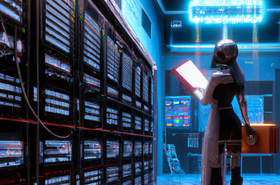After recovering from the roller coaster ride that was the grades for my 2022 predictions, it’s time to unleash my fearless prognostications for 2023. Read on to hear my rants on nuclear power, ChatGPT, the use of data in construction, 5G, and prefabricated data centers.
1 - A data center or cloud operator will sign up for nuclear power
This is probably my most aspirational prediction for this year, but I think there is a real chance that it happens. With any luck, it’s already in the works. As some of you may recall, I predicted that nuclear power would make headway in my 2022 predictions. I am doubling down in 2023 and say that some enlightened hyperscaler will make a commitment to nuclear power this year.
The hyperscale tech companies are leading the world in the purchase of clean energy as it is. It’s obvious we need to do more to make progress against climate change. Why would they not consider nuclear energy? It is not intermittent like renewable energy and the small modular reactor (SMR) designs provide the opportunity to place them closer to where the power will be used. I am not saying you will be able to place them just anywhere, but there are more options with the latest technology.
A Datacenter Dynamics article from December of 2022 announced the agreement between Shell and NuScale to assess the idea of putting hydrogen production systems at SMR sites. So, whoever makes the leap will not be the first one to do so. NIMBY (not in my back yard) will no doubt be an issue as it is with data centers themselves, but, where there is a will — and lots of money — there is a way. What if you owned over 2,000 acres of land in Maryland with a plan to create a first-of-its kind, environmentally friendly data center campus? With 2,000 acres, you don’t have any neighbors. Argue all you want about nuclear being environmentally friendly, but it’s carbon-free power. If that’s not enough for you, Oliver Stone even made a movie about the benefits of nuclear power as it relates to climate change!
Am I saying data center operators are going to start buying SMRs and operating them? Heck no, but why not enter into power purchase agreements (PPAs) like how renewables are contracted for today? With data center campuses in the 200-300 MW range and larger in development, it’s easy to imagine an appropriately sized SMR farm being installed nearby, to avoid at least some of the inefficiencies of the power grid.
2 - Generative AI tools like ChatGPT will threaten the educational system and anything else that requires writing
In November of 2023, ChatGPT made its public debut and quickly caused quite a stir. ChatGPT is a generative artificial intelligence chatbot created by San Francisco-based OpenAI. GPT stands for “generative pretrained transformer.” Sounds harmless right? More than a million people signed up to test it within five days.
ChatGPT continues to amaze users by creating amazing content in seconds. It has reportedly repaired faulty computer code and written college level essays [and we also gave it some test journalistic assigments - Editor]. What could go wrong? Well, that educational part is where I fear real damage may be done, or perhaps already has.
When I asked ChatGPT if it would negatively impact the educational system, it gave me the following response:
“It is unlikely that ChatGPT would have a negative impact on the educational system. However, like any technology, it does have the potential to be used in ways that could be detrimental to education. For example, if students were to use ChatGPT to generate entire papers or homework assignments, it could be detrimental to their learning and development. However, if ChatGPT is used as a tool to help students with specific language-related tasks, such as grammar and vocabulary, it could enhance the learning experience. Additionally, teachers and educators could use ChatGPT to generate lesson plans, quizzes, and other materials. It's important to note that ChatGPT is a tool and it's up to the users to use it in an appropriate way. It's also important to keep in mind that AI is still in its early stages and its capabilities will continue to improve. It's important to use AI, including ChatGPT, in a way that benefits education and learning.”
So very well written and intended, but it obviously assumes that all people are ethical and logical instead of taking the easy way out whenever possible. There are already many documented cases of ChatGPT being used to write papers, so there has already been some level of impact. I am sure someone much smarter than I can create a tool to detect if a generative AI tool was used on a paper, but that is just one more step that underpaid teachers will have to perform. Perhaps my prediction is already a reality. One thing is certain, if I had used ChatGPT on my predictions, they would have been out in early January instead of early February (and maybe more accurate).
3 - Big tech layoffs will increase the need for contingent workers/staff augmentation
Over the last few months, we’ve heard of one round of layoffs after another from the big tech companies. It’s put many thousands of people in tough situations, so I won’t take my typical sarcastic tone on this prediction. On a positive note, there is a lot of talent on the market, but they are getting snatched up quickly in many cases.
Of the many definitions online for a contingent worker, I like the one from BambooHR the best - essential they are contractors, freelances, consultants or temporary staff
The benefits of this are many for both the hiring company and the employee. Among them is that the hiring company doesn’t have to pay the contingent workers benefits themselves and their services can be turned on and off to suit your specific needs. For the team member, it gives them great flexibility. They can choose which opportunities are most compelling to them and see the country if they choose to be a traveler.
One thing to watch out for is how the contingent worker is cared for by their employer [and some tech firms, such as Google, have a bad record here - Editor]. Staffing agencies tend to be very transactional and do little to nothing to mentor and train their workers. Their benefits may also be substandard if they exist at all. In other cases, there are top notch benefits, the team member is mentored, and they are trained to keep up with current technology. The latter tends to be a bit more expensive, but the team members tend to be happier and more productive. Who wants to be treated like a commodity? Make an informed decision and reap the benefits.
4 - Use of data in construction expands and yields new insights
The construction industry has long been perceived as a bunch of abacus-using Luddites. Although this is far from the truth, we are the only non-farm industry that has not improved its labor productivity in almost 60 years. The industry has been very good at gathering data, but we haven’t always done much with it other than the standard metrics and cost reports because there is so much data and it is coming at us so fast that there was no way to process it.
There have always been stellar examples of great projects that did incredible work such as the Empire State building, Pentagon, etc., but the nature of the industry makes every project a silo because they do not move from where they are built, and the teams are broken up after the project. Today digitization allows us to capture and process more data faster and more effectively than we ever have before while storing the expertise of the designers and builders in digital code to be used to improve the process of designing and building. Our construction sites need to feel like Thursday Night Football games on Amazon Prime or F1 races with real time data coming in from all over the world to build and improve outcomes.
Perhaps this is another one of my aspirational predictions, but I think 2023 is the year when this changes. There are some enlightened souls that are already slicing and dicing data differently than I have ever seen, including the Chief Innovation Officer of OAC. How valuable would it be to a wholesale colocation provider for their construction manager to be able to tell them how fast their contractor needs to build their data center to maximize their revenue? How about analyzing their schedule on day 1 and telling them the likelihood that they will meet that schedule? What about using the data to break down work in a much more granular way and improve productivity in a way we haven’t seen in decades?
It's all possible now, and I predict that 2023 will be the year that it comes to fruition and yields new insights.
5 - 5G fails to live up to the hype…again
I am doing a 180° reversal from last year when I idiotically predicted that 5G would start to live up to the hype. This was one of my predictions that received a grade of an F in 2022. As TechDirt put it, 5G was largely just hype by telecoms and hardware vendors eager to sell more gear and to justify high US mobile data prices. I am a glutton for punishment on this one as I started making predictions about 5G back in 2019. I am no smarter than Charlie Brown, who always thought this would be the time he would get to kick the football, only to have Lucy pull it away yet again. 5G will not live up to the hype in 2023 and I don’t think it ever will. That said, when asked, ChatGPT still seems optimistic about its potential.
6 - Microsoft’s investment in ChatGPT creator OpenAI will make Bing relevant
Apparently ChatGPT is to this year’s predictions as the metaverse was to my predictions last year. I am a sucker for a good buzzword. In mid-January, Microsoft announced that it would add ChatGPT to Azure. Not long after, Microsoft confirmed that it was making a "multiyear, multibillion-dollar investment" in OpenAI. Although they have only announced adding ChatGPT to Azure, one would think it’s only a matter of time before they add it to their little-used Bing search engine. My prediction is that they will add ChatGPT to Bing and it will become a relevant competitor to Google’s search. How ironic that Google developed Transformer technology, the very techniqie that ChatGPT is built upon.
7 - Regulation strikes the data center industry
Many in the data center industry have said it for a long time, regulate yourself or someone else will do it for you. Regulation can apply to many areas ranging from where you build your data center to the source of the power used in it. There have been the much publicized goings on in northern Virginia where one senator tried to stymie the PW Digital Gateway project, then the state developed a new ‘Mega Data Center Incentive Program’ to attract a $35B investment from AWS.
The news that caught my attention from a regulatory standpoint came out of Oregon where a proposed bill would establish clean energy standards for data centers and crypto miners. Many of the large data center and cloud operators are already committed to renewable energy, but if this bill passes, it will require it. That will leave a mark for some of the crypto miners that will use the cheapest power they can find, regardless of how it is produced. I predict that this type of environmentally based regulation picks up momentum in 2023.
8 - The edge will usher in the golden age of prefabricated data centers
I have been beating the prefab drum going all the way back to the mid 1990’s when I led teams that installed over 650 prefabricated telecom huts across the US for the Qwest Communications nationwide network, so making a prediction on prefab data centers shouldn’t surprise anyone. With the maturation of the edge market, the only path to delivering the number of facilities that will be necessary is through prefabrication.
Speed to market and overcoming the labor shortage in construction is just the start of what prefabrication has to offer. Prefabricated data centers are also pushing hard to incorporate sustainability initiatives and making good progress. A little under a year ago Compass Datacenters announced the launch of Compass Quantum and their white-space-as-a-service with 100 kW modules. More recently, startup ECL came flying off the top rope with their newly announced hydrogen-powered off-grid 3D-printed data centers. Saying that the edge will usher in the golden age of prefabricated data centers is pretty fluffy as a prediction, so I will say that 2023 will be the year that the edge will lead to greater innovation in, and the proliferation of, prefabricated data centers.
Time will tell…
There you have it, the 9th annual edition of my post-holiday divinations about the data center and tech world. As always, I tried my best to include the most recent buzzwords (ChatGPT) as many times as possible to rank high in the search engines. I also think this is my longest blog to date, so many thanks to those that stuck it out until the end! There are a few predictions that I really have no business even talking about, so it will be fun to see how they all pan out. I am always interested in hearing your thoughts on my predictions, so please comment and/or reach out on LinkedIn or Twitter.




